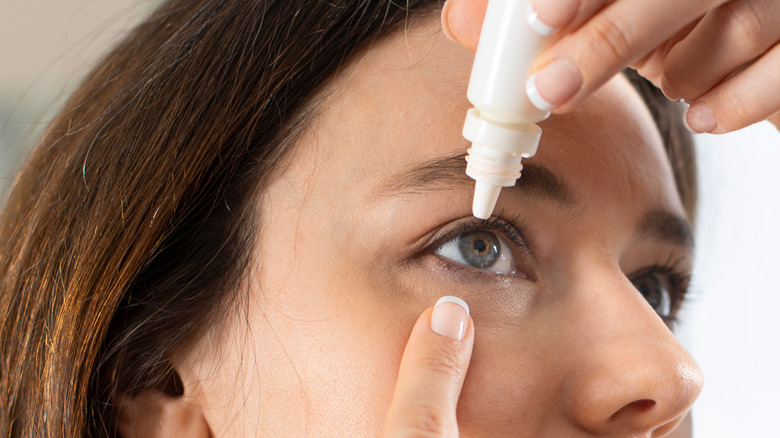Your Dry Eyes Could Be A Sign Of Something Else
Are your eyes dry more often than not? While it's normal to have dry eyes every now and then, your symptoms shouldn't last longer than a few days. As Healthline explains, this condition can be temporary or permanent depending on its cause. For example, people who spend long hours in front of a screen are more likely to experience eye dryness, blurred vision, neck pain, and headaches, according to 2018 research published in the journal Northern Clinics Of Istanbul. This habit can affect the tear film and blink rate, causing the tears to evaporate more quickly. Chances are, your eyes will return to normal after a few days of rest.
In some cases, eye dryness can last a lifetime. Certain conditions, such as lupus and diabetes, may alter tear production and cause eye discomfort, notes Healthline. Aging plays a role, too, says the American Optometric Association (AOA). Tear production decreases over time, which can lead to dry eyes later in life. This symptom is often accompanied by eye irritation, redness, itching, and light sensitivity.
The AOA reports that dry eye disease affects more than 16 million people in the US alone. However, this number may actually be higher because many cases go undiagnosed. The question is, when should you worry about your eyes and see a doctor? Let's find out.
Your eyes may be dry because of an underlying condition
Sometimes, dry eye is more than just a nuisance. This common health complaint may indicate an underlying condition, infection, or vitamin deficiency. In such cases, you'll likely experience several other symptoms that may seem unrelated to an eye problem. For example, vitamin A deficiency can lead to xerophthalmia, a disease that causes dry eyes, night blindness, and open sores on the cornea, according to WebMD. A diet low in this nutrient can also cause skin problems, recurring infections, and infertility, warns MedicalNewsToday.
Another common cause of dry eyes is Sjogren's syndrome, an autoimmune disorder that tends to develop after age 40. Sufferers may also experience joint pain, dry mouth, fatigue, and inflammation of the salivary glands, explains the Mayo Clinic. If you're a woman, you may notice vaginal dryness, too. This disease affects the lacrimal and salivary glands, causing your immune system to attack healthy tissues. In other cases, eye dryness is due to a viral infection, such as hepatitis C or herpes, notes a 2013 review featured in the Arquivos Brasileiros de Oftalmologia.
Treatment for dry eye disease depends on the underlying cause. Generally, this condition can be managed with prescription drops and artificial tears, but there are cases where doctors may recommend antibiotics or lacrimal plugs (per Review of Ophthalmology). For starters, consider using artificial tears and try to limit screen time. If your symptoms persist, ask your healthcare provider to refer you to an ophthalmologist.


